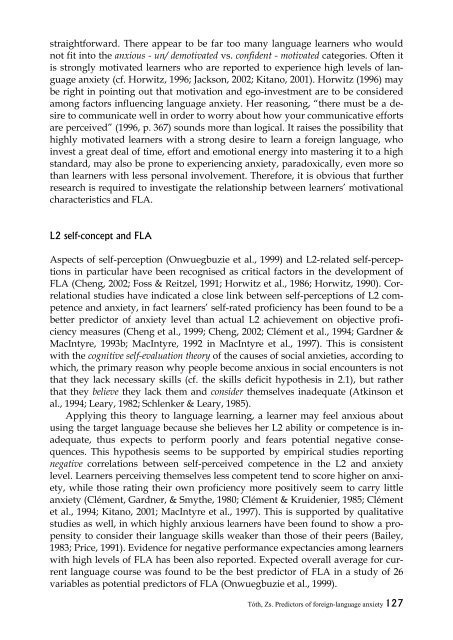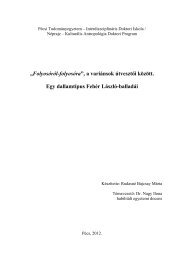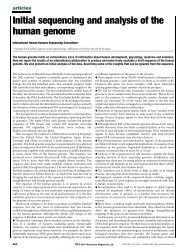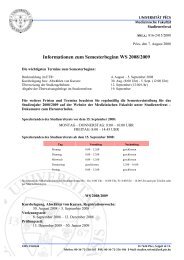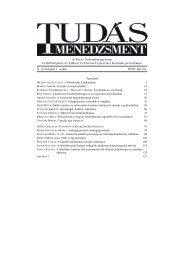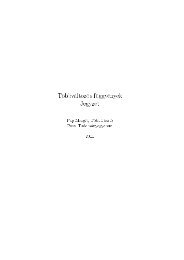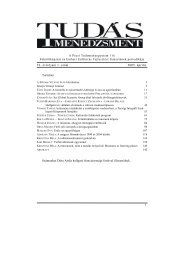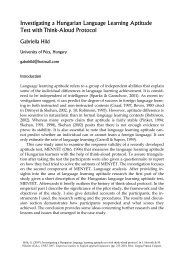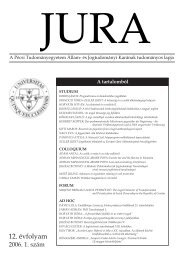Predictors of Foreign-Language Anxiety: Examining the ...
Predictors of Foreign-Language Anxiety: Examining the ...
Predictors of Foreign-Language Anxiety: Examining the ...
Create successful ePaper yourself
Turn your PDF publications into a flip-book with our unique Google optimized e-Paper software.
straightforward. There appear to be far too many language learners who wouldnot fit into <strong>the</strong> anxious - un/ demotivated vs. confident - motivated categories. Often itis strongly motivated learners who are reported to experience high levels <strong>of</strong> languageanxiety (cf. Horwitz, 1996; Jackson, 2002; Kitano, 2001). Horwitz (1996) maybe right in pointing out that motivation and ego-investment are to be consideredamong factors influencing language anxiety. Her reasoning, “<strong>the</strong>re must be a desireto communicate well in order to worry about how your communicative effortsare perceived” (1996, p. 367) sounds more than logical. It raises <strong>the</strong> possibility thathighly motivated learners with a strong desire to learn a foreign language, whoinvest a great deal <strong>of</strong> time, effort and emotional energy into mastering it to a highstandard, may also be prone to experiencing anxiety, paradoxically, even more sothan learners with less personal involvement. Therefore, it is obvious that fur<strong>the</strong>rresearch is required to investigate <strong>the</strong> relationship between learners’ motivationalcharacteristics and FLA.L2 self-concept and FLAAspects <strong>of</strong> self-perception (Onwuegbuzie et al., 1999) and L2-related self-perceptionsin particular have been recognised as critical factors in <strong>the</strong> development <strong>of</strong>FLA (Cheng, 2002; Foss & Reitzel, 1991; Horwitz et al., 1986; Horwitz, 1990). Correlationalstudies have indicated a close link between self-perceptions <strong>of</strong> L2 competenceand anxiety, in fact learners’ self-rated pr<strong>of</strong>iciency has been found to be abetter predictor <strong>of</strong> anxiety level than actual L2 achievement on objective pr<strong>of</strong>iciencymeasures (Cheng et al., 1999; Cheng, 2002; Clément et al., 1994; Gardner &MacIntyre, 1993b; MacIntyre, 1992 in MacIntyre et al., 1997). This is consistentwith <strong>the</strong> cognitive self-evaluation <strong>the</strong>ory <strong>of</strong> <strong>the</strong> causes <strong>of</strong> social anxieties, according towhich, <strong>the</strong> primary reason why people become anxious in social encounters is notthat <strong>the</strong>y lack necessary skills (cf. <strong>the</strong> skills deficit hypo<strong>the</strong>sis in 2.1), but ra<strong>the</strong>rthat <strong>the</strong>y believe <strong>the</strong>y lack <strong>the</strong>m and consider <strong>the</strong>mselves inadequate (Atkinson etal., 1994; Leary, 1982; Schlenker & Leary, 1985).Applying this <strong>the</strong>ory to language learning, a learner may feel anxious aboutusing <strong>the</strong> target language because she believes her L2 ability or competence is inadequate,thus expects to perform poorly and fears potential negative consequences.This hypo<strong>the</strong>sis seems to be supported by empirical studies reportingnegative correlations between self-perceived competence in <strong>the</strong> L2 and anxietylevel. Learners perceiving <strong>the</strong>mselves less competent tend to score higher on anxiety,while those rating <strong>the</strong>ir own pr<strong>of</strong>iciency more positively seem to carry littleanxiety (Clément, Gardner, & Smy<strong>the</strong>, 1980; Clément & Kruidenier, 1985; Clémentet al., 1994; Kitano, 2001; MacIntyre et al., 1997). This is supported by qualitativestudies as well, in which highly anxious learners have been found to show a propensityto consider <strong>the</strong>ir language skills weaker than those <strong>of</strong> <strong>the</strong>ir peers (Bailey,1983; Price, 1991). Evidence for negative performance expectancies among learnerswith high levels <strong>of</strong> FLA has been also reported. Expected overall average for currentlanguage course was found to be <strong>the</strong> best predictor <strong>of</strong> FLA in a study <strong>of</strong> 26variables as potential predictors <strong>of</strong> FLA (Onwuegbuzie et al., 1999).Tóth, Zs. <strong>Predictors</strong> <strong>of</strong> foreign-language anxiety 127


